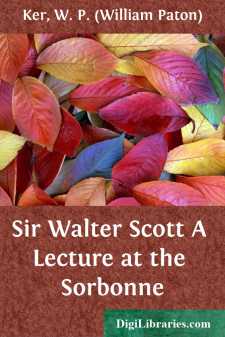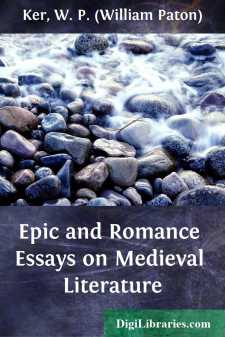Categories
- Antiques & Collectibles 13
- Architecture 36
- Art 48
- Bibles 22
- Biography & Autobiography 813
- Body, Mind & Spirit 142
- Business & Economics 28
- Children's Books 17
- Children's Fiction 14
- Computers 4
- Cooking 94
- Crafts & Hobbies 4
- Drama 346
- Education 46
- Family & Relationships 57
- Fiction 11829
- Games 19
- Gardening 17
- Health & Fitness 34
- History 1377
- House & Home 1
- Humor 147
- Juvenile Fiction 1873
- Juvenile Nonfiction 202
- Language Arts & Disciplines 88
- Law 16
- Literary Collections 686
- Literary Criticism 179
- Mathematics 13
- Medical 41
- Music 40
- Nature 179
- Non-Classifiable 1768
- Performing Arts 7
- Periodicals 1453
- Philosophy 64
- Photography 2
- Poetry 896
- Political Science 203
- Psychology 42
- Reference 154
- Religion 513
- Science 126
- Self-Help 84
- Social Science 81
- Sports & Recreation 34
- Study Aids 3
- Technology & Engineering 59
- Transportation 23
- Travel 463
- True Crime 29
Sir Walter Scott A Lecture at the Sorbonne
Categories:
Description:
Excerpt
Sir Walter Scott
When I was asked to choose a subject for a lecture at the Sorbonne, there came into my mind somehow or other the incident of Scott's visit to Paris when he went to see Ivanhoe at the Odéon, and was amused to think how the story had travelled and made its fortune:—
'It was an opera, and, of course, the story sadly mangled and the dialogue in great part nonsense. Yet it was strange to hear anything like the words which (then in an agony of pain with spasms in my stomach) I dictated to William Laidlaw at Abbotsford, now recited in a foreign tongue, and for the amusement of a strange people. I little thought to have survived the completing of this novel.'
It seemed to me that here I had a text for my sermon. The cruel circumstances of the composition of Ivanhoe might be neglected. The interesting point was in the contrast between the original home of Scott's imagination and the widespread triumph of his works abroad—on the one hand, Edinburgh and Ashestiel, the traditions of the Scottish border and the Highlands, the humours of Edinburgh lawyers and Glasgow citizens, country lairds, farmers and ploughmen, the Presbyterian eloquence of the Covenanters and their descendants, the dialect hardly intelligible out of its own region, and not always clear even to natives of Scotland; on the other hand, the competition for Scott's novels in all the markets of Europe, as to which I take leave to quote the evidence of Stendhal:—
'Lord Byron, auteur de quelques héroïdes sublimes, mais toujours les mêmes, et de beaucoup de tragédies mortellement ennuyeuses, n'est point du tout le chef des romantiques.
'S'il se trouvait un homme que les traducteurs à la toise se disputassent également à Madrid, à Stuttgard, à Paris et à Vienne, l'on pourrait avancer que cet homme a deviné les tendances morales de son époque.'
If Stendhal proceeds to remark in a footnote that 'l'homme lui-même est peu digne d'enthousiasme,' it is pleasant to remember that Lord Byron wrote to M. Henri Beyle to correct his low opinion of the character of Scott. This is by the way, though not, I hope, an irrelevant remark. For Scott is best revealed in his friendships; and the mutual regard of Scott and Byron is as pleasant to think of as the friendship between Scott and Wordsworth.
As to the truth of Stendhal's opinion about the vogue of Scott's novels and his place as chief of the romantics, there is no end to the list of witnesses who might be summoned. Perhaps it may be enough to remember how the young Balzac was carried away by the novels as they came fresh from the translator, almost immediately after their first appearance at home.
One distinguishes easily enough, at home in Scotland, between the novels, or the passages in the novels, that are idiomatic, native, homegrown, intended for his own people, and the novels not so limited, the romances of English or foreign history—Ivanhoe, Kenilworth, Quentin Durward. But as a matter of fact these latter, though possibly easier to understand and better suited to the general public, were not invariably preferred. The novels were 'the Scotch novels.' Although Thackeray, when he praises Scott, takes most of his examples from the less characteristic, what we may call the English group, on the other hand, Hazlitt dwells most willingly on the Scotch novels, though he did not like Scotsmen, and shared some of the prejudice of Stendhal—'my friend Mr. Beyle,' as he calls him in one place—with regard to Scott himself. And Balzac has no invidious preferences: he recommends an English romance, Kenilworth, to his sister, and he also remembers David Deans, a person most intensely and peculiarly Scots.
One may distinguish the Scotch novels, which only their author could have written, from novels like Peveril of the Peak or Anne of Geierstein, which may be thought to resemble rather too closely the imitations of Scott, the ordinary historical novel as it was written by Scott's successors....



